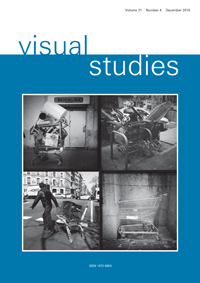 A paper that I presented at a conference on Photography and Anthropology in 2014 was (finally) published today. It is somehow disappointing that the publishing process takes so long because I would probably approach the paper differently now. In any case, I think it could be useful to expand the discussion about mobile/visual/digital ethnographies. Here is the link to the text and here is the abstract:
A paper that I presented at a conference on Photography and Anthropology in 2014 was (finally) published today. It is somehow disappointing that the publishing process takes so long because I would probably approach the paper differently now. In any case, I think it could be useful to expand the discussion about mobile/visual/digital ethnographies. Here is the link to the text and here is the abstract:
This article presents an outline of the concept ‘Trajectory’. I propose to understand trajectory not only as a trace of movement in a path but also as a working concept to reflect on the possibilities of visual/digital data collection for ethnographic research on the move. Images, I argue, along with some digital affordances such as metadata and GPS, can be a powerful device for ethnographic enquiry and a useful tool for reflexivity if used by making sense of the randomness of everyday mobility. The concept of ‘Trajectory’ seeks to reflect on the relationship between four elements: mobility, visual data, digital methods and reflexivity, focusing on the use of the mobile phone as a tool to engage with these elements while reflecting on them. The concept of trajectories is intended to establish a dialogue with that of the flâneur in de Certeau’s and Benjamin’s work and with some current approaches to visual/digital ethnography, especially those related to movement and senses, art and ethnography and mobilities and locative media.
P.S. It was fun that the editors chose my images for the journal’s cover
